I'm trying to create a thread pool in python and thought all was well and good until I went to run some tests.
In my tests I am recording the time it takes for n tasks to be completed with x threads. I then plotted this data to check whether or not the output resembled what I thought to be correct. Unfortunately I'm getting unexpected results. For whatever reason my delta t for certain tests doesn't conform to the expected line other points lay on. I believe this is a thread synchronization issue having to do with threading.Event() in my code. I'm not very familiar with Python so maybe I am overlooking something.
What's causing my thread pool to give unexpected results in my tests? Any help is appreciated thanks!

Thread Count:
[2, 4, 6, 8, 10, 12, 14, 16, 18, 20, 22, 24, 26, 28, 30, 32, 34, 36, 38, 40]
Delta t:
[15.005759, 0.002, 5.003255, 1.995844, 0.99826, 0.006006, 0.997074, 0.994626, 0.002004, 0.988823, 0.005081, 0.993242, 0.990138, 0.002986, 0.995473, 0.000999, 0.986356, 0.002002, 0.975053, 0.021287]
Below is my code:
from threading import Thread
from threading import Event
from queue import Queue
from time import sleep
import matplotlib.pyplot as plt
import datetime
import requests
import random
import json
import copy
import sys
class Tester:
def __init__(self):
pass
def run(self):
numThreads = 2
x = [] # thread count
y = [] # delta time
for t in range(20): # Run t tests
threadPool = ThreadPool(numThreads)
startTime = datetime.datetime.now()
x.append(numThreads)
print("Starting test %d" % (t + 1))
# Add n tasks
for n in range(30):
threadPool.addTask(PoolTask(n))
threadPool.start() # wait until all tasks are added before starting
# Wait for all tasks in queue to complete
threadPool.wait()
timeDelta = datetime.datetime.now() - startTime
print("Test %d complete (t=%f s, n=%d)" % ((t + 1), timeDelta.total_seconds(), numThreads))
y.append(timeDelta.total_seconds())
numThreads += 2
# After the tests plot the resulting data
print(x)
print(y)
plt.plot(x, y, 'ro')
plt.xlabel('thread count')
plt.ylabel('delta t (time)')
plt.show()
class ThreadPool:
__poolEvent = Event()
__runEvent = Event()
def __init__(self, size = 1, start=False):
self.__size = size
self.__queue = Queue()
self.__pool = []
self.__destroyed = False
if start:
__runEvent.set()
# Create the thread pool
for i in range(self.__size):
thread = Thread(target = self.__worker, args = [i])
self.__pool.append(thread)
thread.daemon = True
thread.start()
pass
def __worker(self, workerNumber):
# Worker will run until thread pool is terminated
while True:
if(self.__destroyed):
break
self.__runEvent.wait() # Wait until threadpool is started
task = self.__queue.get() # Blocking
try:
task.execute()
except (AttributeError, TypeError):
raise Exception('Task does not have execute() defined.')
self.__queue.task_done()
if self.__queue.empty():
self.__poolEvent.set() # Allow caller to proceed if waiting
def start(self):
self.__runEvent.set()
def addTask(self, task):
if(self.__destroyed):
raise Exception('Unable to add task the pool has already been destroyed.')
self.__poolEvent.clear() # Have caller wait if listening
self.__queue.put(task)
def destroy(self):
if(self.__destroyed):
raise Exception('Cannot destory as the thread pool has already been destroyed.')
# Flag causes threads to stop pulling from queue and return
self.__destroyed = True
def wait(self):
self.__poolEvent.wait()
class PoolTask:
""" example task that implements execute() """
def __init__(self, taskNumber):
self.taskNumber = taskNumber
def execute(self):
#print('Task %d executing...' % self.taskNumber)
#sleep(random.randint(1, 5))
sleep(1)
#print('Task %d done executing' % self.taskNumber)
Execution Output:
>>> import Tester
>>> kp = KrogoPoints.KrogoPoints()
>>> kp.run()
Starting test 1
Test 1 complete (t=15.005759 s, n=2)
Starting test 2
Test 2 complete (t=0.002000 s, n=4)
Starting test 3
Test 3 complete (t=5.003255 s, n=6)
Starting test 4
Test 4 complete (t=1.995844 s, n=8)
Starting test 5
Test 5 complete (t=0.998260 s, n=10)
Starting test 6
Test 6 complete (t=0.006006 s, n=12)
Starting test 7
Test 7 complete (t=0.997074 s, n=14)
Starting test 8
Test 8 complete (t=0.994626 s, n=16)
Starting test 9
Test 9 complete (t=0.002004 s, n=18)
Starting test 10
Test 10 complete (t=0.988823 s, n=20)
Starting test 11
Test 11 complete (t=0.005081 s, n=22)
Starting test 12
Test 12 complete (t=0.993242 s, n=24)
Starting test 13
Test 13 complete (t=0.990138 s, n=26)
Starting test 14
Test 14 complete (t=0.002986 s, n=28)
Starting test 15
Test 15 complete (t=0.995473 s, n=30)
Starting test 16
Test 16 complete (t=0.000999 s, n=32)
Starting test 17
Test 17 complete (t=0.986356 s, n=34)
Starting test 18
Test 18 complete (t=0.002002 s, n=36)
Starting test 19
Test 19 complete (t=0.975053 s, n=38)
Starting test 20
Test 20 complete (t=0.021287 s, n=40)